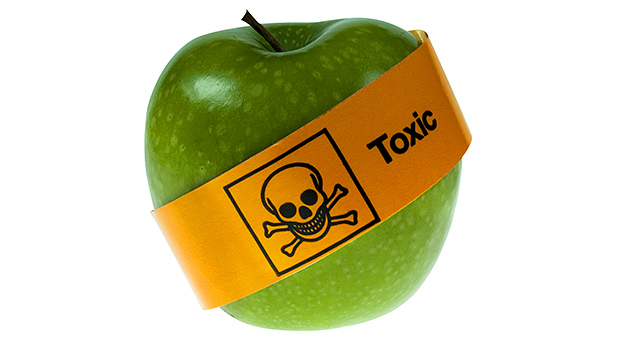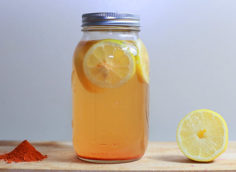Every year, farmers dump about 1.3 million pounds of pesticides on U.S. crops. That equates to about 6 pounds of tumor-growing pesticides on every acre of farmland.
Of the 35,000 registered pesticides used in this country, fewer than 21% have been tested for carcinogenicity. Fewer than 10% have been tested for their potential to cause mutations and fewer than 40% have been tested for their potential to cause birth defects.
The good thing is that we've banned plenty of pesticides and since we're nothing but savvy – if not unscrupulous – businessmen, the U.S. exports between 100 and 150 million tons of these banned pesticides every year to suckers in other countries.
Unfortunately, we import 40% of all our fruit and about 12% of all our vegetables back from these countries, so it's fairly certain that we end up eating these banned pesticides anyway.
Even if we're not ingesting the pesticides we explicitly banned, we do know that imported fruits and vegetables usually have three times the amount of pesticides that our grown-in-the U.S. counterparts have, and that the FDA only manages to check about 1% of the stuff we import.
That's not to say U.S. grown produce is much better. One third of the home-grown versions contain multiple residues, exposing us to cancer-causing chemicals and possible neurological disorders, not to mention disturbing endocrine disruptions.
As you might guess, some fruits and vegetables are worse than others. Some, because of their leafy configuration, attractiveness to certain insects or fungi, or length of growing season, require more pesticide than others.
The Consumers Union (the publishers of Consumer Reports) and a research group named the Environmental Working Group, using data from the U.S. Food and Drug Administration, have compiled a list of the worst fruits and vegetables in regards to health risks associated with pesticides.
If you eat just five fruits and veggies from this list, you've ingested at least 10 different pesticides, many of which will gleefully take up residence in your organs and body fat. Here's the list:
- Strawberries
- Bell Peppers (both green and red)
- Spinach
- Cherries (US grown)
- Peaches
- Cantaloupes (Mexico grown)
- Celery
- Apples
- Apricots
- Green beans
- Grapes (Chile)
- Cucumbers
- Pears
- Winter squash (US)
- Potatoes
- Blueberries
A couple of these deserve special mention because they're especially tainted. Apples, for instance, are targeted by more pesticides (36) than any other fruit or vegetable, and up to 7 different types have been found on a single sample.
Likewise, strawberries have really high levels of fungicides, two of which are probable carcinogens and another of which interferes with testosterone.

Fortunately, there's also a list of fruits and vegetables that are relatively clean in terms of pesticides:
- Onions
- Avocado
- Sweet corn
- Pineapples
- Mangos
- Sweet peas
- Asparagus
- Kiwi
- Cabbages
- Eggplants
- Cantaloupe (US grown)
- Watermelons
- Grapefruits
- Sweet potatoes
- Honeydew melons
- You could consign yourself to just eating foods from the "Clean 15." Unfortunately, you wouldn't be getting enough variety.
- You could say "screw it" and continue eating whatever fruits and vegetables you fancy, hoping against odds that the health and life-promoting constituents of these foods will outweigh the possible negative effects of the chemicals and pesticides. Good luck on that one.
- You could go organic. The trouble is, buying organic is expensive.
- You could wash your fruits and vegetables in a solution containing one teaspoon of dishwashing detergent in a gallon of warm water. Swirl the produce in the solution for 10 seconds, and then rinse thoroughly, lest you prefer your stir-fry be flavored with a dash of Palmolive.
- You could peel those fruits or vegetables that are amenable to peeling, thereby mechanically removing most pesticides or chemicals (while also sacrificing some nutrients and fiber). Similarly, you can discard the outer leaves of vegetables and just eat the stuff inside.
- You could buy frozen or canned fruits and vegetables. The washing and blanching that prepares fruits and vegetables for freezing or canning supposedly removes between 80 and 90% of pesticides.
- You could stick mostly to the clean list, dip into the "dirty list" on occasion for variety, and supplement with Biotest Superfood, a freeze-dried preparation of 18 fruits, berries, and vegetables. That way you'll get plenty of vitamins, minerals, and specific phytonutrients without having to eat a garden of fruits and veggies every day.




